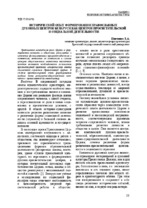Исторический опыт формирования православных духовных центров Беларуси как центров просветительской и социальной деятельности
Another Title
Orthodox spiritual centers of Belarus: historical experience of formation during the period from XI to the end of the XVIII century
Bibliographic entry
Панченко, Т. А. Исторический опыт формирования православных духовных центров Беларуси как центров просветительской и социальной деятельности = Orthodox spiritual centers of Belarus: historical experience of formation during the period from XI to the end of the XVIII century / Т. А. Панченко // Архитектура : сборник научных трудов / редкол.: А. С. Сардаров (гл. ред.) [и др.]. – Минск : БНТУ, 2019. – Вып. 12. – С. 33-36.
Abstract
Традиционно важнейшая роль Церкви в формировании личности и общества, расширение и изменение функциональных программ объектов и комплексов, включение её комплексов в состав центров общественного назначения населённых пунктов вызывает необходимость осмысления архитектурной практики исторического опыта социального служения Православной Церкви. В статье проанализирован опыт формирования особого типа религиозно-общественного комплекса – православный духовный центр.
Abstract in another language
For the sustainable and harmonious development of the Belarusian society in the current situation of changing ideological orientations, worldview paradigms is particularly important and understanding the Church is in demand as a real factor in the life of a modern person, on the one hand, and rethinking its role in new social and ideological conditions, on the other hand. In the general historical and cultural context, the developed religious consciousness to a large extent was the basis of spirituality and statehood. The most complete and consistent transfer of traditional national and religious values and in general, the influence of the Belarusian Orthodox Church has always been carried out thanks to its broad educational, spiritual and educational activities. Traditionally, the most important role of the Church in the formation of personality and society, the expansion and change of functional programs of objects and complexes, causes the need to understand the architectural and urban practice of the historical experience of social service of the Orthodox Church.

